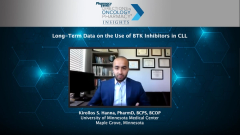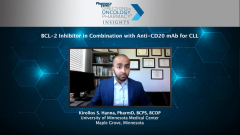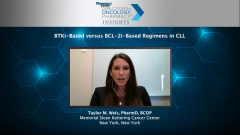
Head-to-Head BTK Inhibitor Data and Cardiovascular Toxicity
Experts discuss the results of a head-to-head trial of ibrutinib versus acalabrutinib in CLL and the cardiovascular toxicity associated with BTK inhibitors.
Episodes in this series

Kirollos S. Hanna, PharmD, BCPS, BCOP: One thing I really like about this specific space in terms of patients is that this is not like immunotherapy, where we have indications across the board for every immunotherapy and we don’t have any head-to-head trials. It’s really exciting to see that we’re beginning to see acalabrutinib versus ibrutinib trials, and zanubrutinib versus the others, to show us if there is one superior BTK [Bruton tyrosine kinase] over another. But it’s also showing us that these BTK inhibitors, in terms of efficacy, share a very similar efficacy profile. What we saw out of ASCO [American Society of Clinical Oncology annual meeting] as well, were final results from a head-to-head acalabrutinib versus ibrutinib trial in previously treated patients with CLL [chronic lymphocytic leukemia]. They looked at patients with deletion 17p. They randomized patients based off of numerous things, and in terms of clinical efficacy, this was a noninferiority trial, and acalabrutinib was deemed noninferior to ibrutinib, with both having a median PFS [progression-free survival] of about 38 months.
In terms of safety, going back to that point, acalabrutinib was actually superior to ibrutinib in all-grade atrial fibrillation, although the [the rates] were very low. Afib [atrial fibrillation] is always a toxicity of interest, is it a contraindication, is it not, what do we do? It was only 9% for acalabrutinib versus about 16% for ibrutinib. Certainly, I think with our patients who might come into the clinic with cardiomyopathy, atrial fibrillation, maybe we should have cardiology [colleagues] on board. Have them do some baseline assessment, clear the patient, and then we can probably treat them safely while on therapy. Most AEs [adverse events] in terms of hypertension, arthralgias, diarrhea, these are I think what we tend to see more in clinic. From this noninferiority trial, they were much lower in the acalabrutinib group versus ibrutinib. Some examples, for hypertension, it was about 9% versus 23% favoring acalabrutinib. Also, arthralgias were about 16% versus 23%, and diarrhea was also lower, about 35% versus 46%. Again, it’s very exciting to see this. AEs that led to a discontinuation were about only 15% on acalabrutinib versus 21% on ibrutinib. It’s very exciting that we are seeing similar efficacy, but also seeing a trend toward maybe one possibly being a better option for your more frail patients with comorbidities, etc. Go ahead Dr Weis, do you have something?
Taylor M. Weis, PharmD, BCOP: I wanted to add some of my experience with treating patients with cardiovascular disease as well. Afib, as you know, comes up a lot, and in a lot of these real-world studies, we’re seeing that of the cardiovascular toxicities, atrial fibrillation seemed to be the most troublesome and caused the most rates of discontinuation. As a result, especially if the patient has a prior history of atrial fibrillation, has a lot of risk factors for developing atrial fibrillation, we try to get cardiology on board and make sure we’re managing with rate and rhythm control strategies that can be optimized with BTK inhibitors. What we’re also seeing is that when a patient comes in, they may be on a rate control strategy, such as diltiazem or verapamil, which also interact with ibrutinib, and so we’re often switching them to preferred β-blockers so the patient can tolerate it up front. Then, obviously if a patient is on ibrutinib and develops atrial fibrillation, we try to use these strategies from the get-go.
Another big thing that comes up is that based on a patient’s risk factors for stroke with atrial fibrillation, if they have enough risk factors, they may be candidates for anticoagulation. Bleeding is one of the notorious BTK inhibitor [adverse] effects that can be very scary for patients and also for providers. What we saw in the initial studies with BTK inhibitors is that patients initially who were treated with BTK inhibitors and a vitamin K antagonist, like warfarin, had very high rates of major bleeding and some fatal subdural hematomas in the studies. For this reason, all the major BTK inhibitor randomized-controlled trials excluded these patients altogether. Thus, as a clinician I try to at all cost to keep the patient from being on a concomitant warfarin. If the patient comes in warfarin for a good indication, we try to touch base with their cardiologist to see if we can get them switched to an alternative agent that may be safer.
As oncologists and oncology pharmacists, we’re getting a lot more comfortable with using the DOACs [direct oral anticoagulants] in the cancer population, and we have seen that patients can tolerate these, apixaban or rivaroxaban, with BTK inhibitors without significantly increased risk of bleeding. The one thing to note is a lot of these patients may have minor bleeding. About 50% of patients will have some minor bleeding or bruising, and it doesn’t necessarily mean that they are at higher risk of major bleeding, the more severe, dangerous bleeding. It’s important to educate the patient on that as well.
Transcript edited for clarity.
Newsletter
Stay informed on drug updates, treatment guidelines, and pharmacy practice trends—subscribe to Pharmacy Times for weekly clinical insights.


































